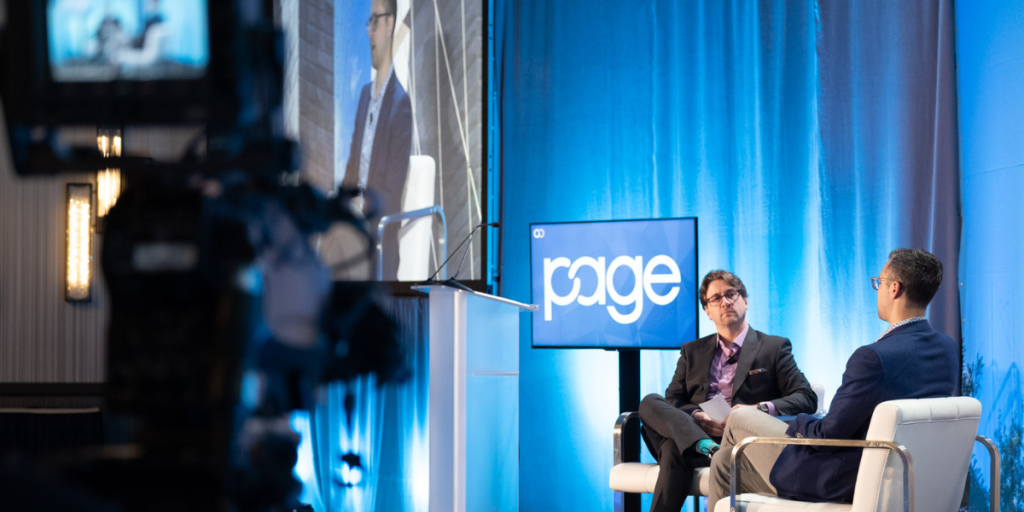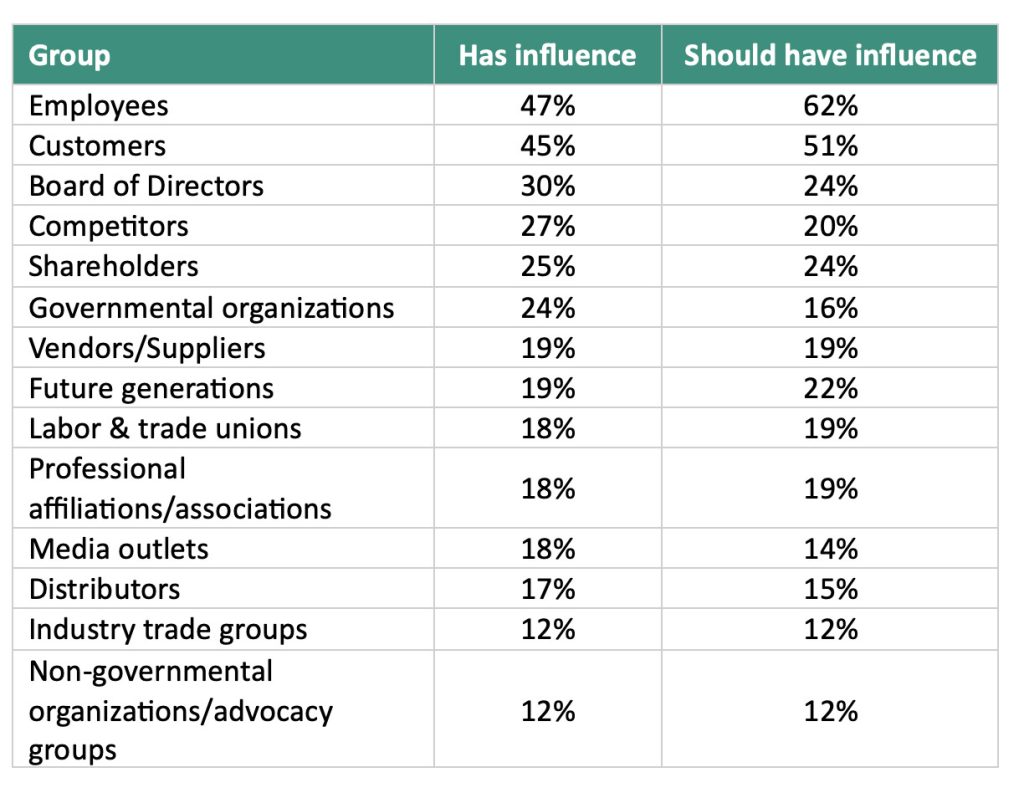The Page Society Spring Seminar has been a cornerstone of The Page Society‘s events. And I’ve been in the Page network for better than a decade now. This community has offered one extraordinary learning experience after another. And, I’m sure it has influenced me in more ways than I even realize.
This year I had the great honor of chairing The Page Society Spring Seminar. An exploration of community and influence took center stage. We heard from so many great speakers and panelists — genuine leaders in their fields. Self-selected “unconference” discussions gave us time to break off and talk to each other. We even built a digital Conference Canvas together — it turned out beautifully!
As the chair, I had the extra privilege of talking with many members and speakers in advance to shape the conversation.
Here are five — OK, five and a half! — things I took away:
1. To be influential, be open to influence.
Keynote speaker Ezra Klein told us that the difference between persuasion and influence is that persuasion doesn’t usually work. That is, it’s hard to make such a compelling argument that people will simply give up beliefs they’re invested in. Influence is more effective because it’s a gradual process. Over time, you might get another person to say, “I see your point,” or “I agree with you about that part.” You might change their thinking, even if you never win them over entirely. And hopefully you can get them to say, “We disagree, but I respect your opinion.” In today’s world, that is no small accomplishment.

But to get there — to reach that point of influence — you have to be open to influence too. You have to be willing to hear them out. You must consider what they have to say, and change some of your own ideas. Influence only happens when both sides truly believe they heard.
2. The deepest influence is achieved through community.
Marketing futurist Mark Schaefer made a compelling case that many organizations are “missing the whole opportunity of brand connection and emotional connection that is unique to community.” A social media follow is good. A content subscription is better. But membership in a community creates the strongest emotional connection.
Schaefer defines three key elements of community:
- Communion: People develop personal relationships with each other — it’s not just about the brand itself.
- Purpose: The community is striving for something bigger than the brand. Some goal that the brand has brought people together to achieve. Think of the outdoor clothing brand Patagonia, whose website features activism almost as prominently as products.
- Authentic feedback: Schaefer calls this “progression.” When the world changes, the conversation within a community changes as well. Providing a brand with a deep understanding of trends and how the community thinks about them.
3. Celebrate diverse voices; start by understanding your own.
I moderated a panel discussion on “Voices of Influence.” Featured experts included Experience Futures founder Howard Pyle, workplace culture expert Emily Goodson, and TikTok Publisher Education leader Jennah Blau. All three provided concrete examples of the principles we heard throughout the conference: Start by listening and understanding. Respect the other party or community. Let them influence you.

Howard explained that in the digital world, “the average user doesn’t exist.” He notes that the mathematical average is made up of wildly different people, few of whom actually fit the description of a hypothetical “average person.” Jenna talked about understanding the unique membership and norms of different social platforms, and the kind of communication they enable: “It’s sharing, it’s more natural, it’s ‘You are like me and I am like you and I want to share this connection.’”
Emily spoke in very personal terms about her life as a person with a visible disability, and how embracing all aspects of her identity made her voice more powerful.
My takeaway: If you understand your own voice, and your own values, then you can invite others in and to be part of your community in the most effective way.
4. Bad influence (such as disinformation) is a real problem, but there are ways to combat it.
Brands can easily become targets of disinformation, whether the motivation is political, financial, or something else. Lisa Kaplan of Alethea, a firm that helps organizations identify and protect themselves from disinformation, says preparedness is key: “You as communicators, while you’re the front-line risk managers, you’re not alone. You have the capability to convene the rest of your organization, whether it’s legal, security, or government affairs. Have those conversations. Think about what you would do if and when those common scenarios happen to you, because preparedness really does go a long way.”
What if an attack happens? Kaplan says, “What we’ve seen be highly successful is, expose the narrative and the actor behind it – with evidence, with accounts, here’s how it’s spreading, here’s how the information flow works. Be able to work with the media to tell that story.”
The same social media tools and algorithms used for marketing and online community building can be used to spread conspiracy theories and disinformation. This becomes even more dangerous when individuals can choose “traditional” media outlets that reinforce their beliefs — creating a feedback loop in which they hear the same messages from all sides. Disinformation & Conspiracy theorist researcher, Dr. Anni Sternisko advised us to be on the lookout for ‘national narcissism’ on the global stage and in the workplace. And, Meghan Conroy of the Atlantic Council’s Digital Forensic Research Lab offered tactics to buttress one‘s own mind from being hijacked by false narratives.
5. Your employees are your most powerful influencers.
At the start of the conference, I shared some very recent research that my agency, Integral, conducted with The Harris Poll. In a national survey of 1,200 employees, we asked respondents how they think about influence within their organizations. We asked both who has influence? and who should have influence?.

The group most often cited as influential was employees — 47% said employees were influential, ahead of customers, boards of directors, competitors, and shareholders. And even more respondents said employees should be influential — 62%. Respondents also said customers should be more influential than they are (51% to 45%), while boards of directors and competitors should be less influential than they are:

The results also underscored the fact that employees — like everyone else! — are a diverse group with needs and attitudes that vary by age, race/ethnicity, gender, political philosophy, and other factors.
While there is a wealth of data to be found in our survey results.*The most important takeaway is that your employees are the leading voices in your network. And they want to be.
5.5 The value of in-person connection, and the value of Page.
For all that we talked about digital communications and communities — for obvious reasons! — the Page Spring Seminar itself was proof of how meaningful, engaging and fun it is to bring people together in person. It was truly wonderful to reconnect with old friends, make new ones, and see my peers connecting with each other and sparking new ideas.
What made it more special was that I chaired the conference in my own home: Brooklyn. And we tried to share the authentic voice of Brooklyn by inviting local musicians to play, eating and drinking local favorites and — most importantly — inviting some students and alumni from Brooklyn CityTech’s Communications Design program to share their amazing ideas with us.
To all who attended — in-person at the world’s best city or online — thank you! I look forward to seeing you in the autumn and at the next Page Spring Seminar at the second-best city in the world, Paris!
*Want to learn more about our findings? Schedule time with me. I’m happy to walk you through them.
This blog post was originally published by Page.org. The Page Society is the leading professional network for Chief Communications Officers, Communications Agency CEOs and academics advancing the strategic value of the CCO.
